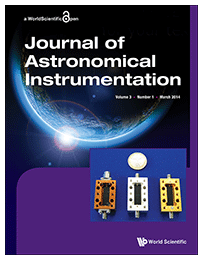Open Access JAI Invites Submissions for Peer Review
Giovanni Fazio Center for Astrophysics | Harvard & Smithsonian
JAI was launched in December 2012 as a bi-annual journal, with production increasing in 2014 to meet demand. In this time there have been two special issues, and the editors now solicit proposals for more. JAI is distinctive in the astronomy and astrophysics literature, offering a high-quality, peer-reviewed venue devoted entirely to topics bearing on instrumentation, with fast turnaround and an open-access option for authors. JAI works to provide first reviews in four weeks, and within a few weeks of being accepted articles are cross-referenced in the NASA Astrophysics Data System (ADS) and receive DOI numbers. JAI also supports free hosting for a growing array of supplemental online information attached to articles and subject to review, including animations and movies, calibration and other data, and research notes.
To promote sharing of knowledge, we encourage authors to publish articles with open access. The corresponding fee to authors of accepted articles is US$1,200, with no page limit. Authors without sufficient funds may publish without charge, with the understanding that access to their articles will be limited to institutional and individual subscribers.
Associate Editors:
- Paul Feldman (Johns Hopkins University, USA)
- Jessica Gaskin (NASA Marshall Space Flight Center, USA)
- Lincoln Greenhill (Harvard-Smithsonian Center for Astrophysics, USA)
- Dietrich Lemke (Max Planck Institute for Astronomy, Heidelberg, Germany)
- Satoshi Miyazaki (National Astronomical Observatory, Japan)
For more information about submissions, please refer to guidelines on the World Scientific webpage. If you would like to propose a special issue, or if you have questions, please contact [email protected].


